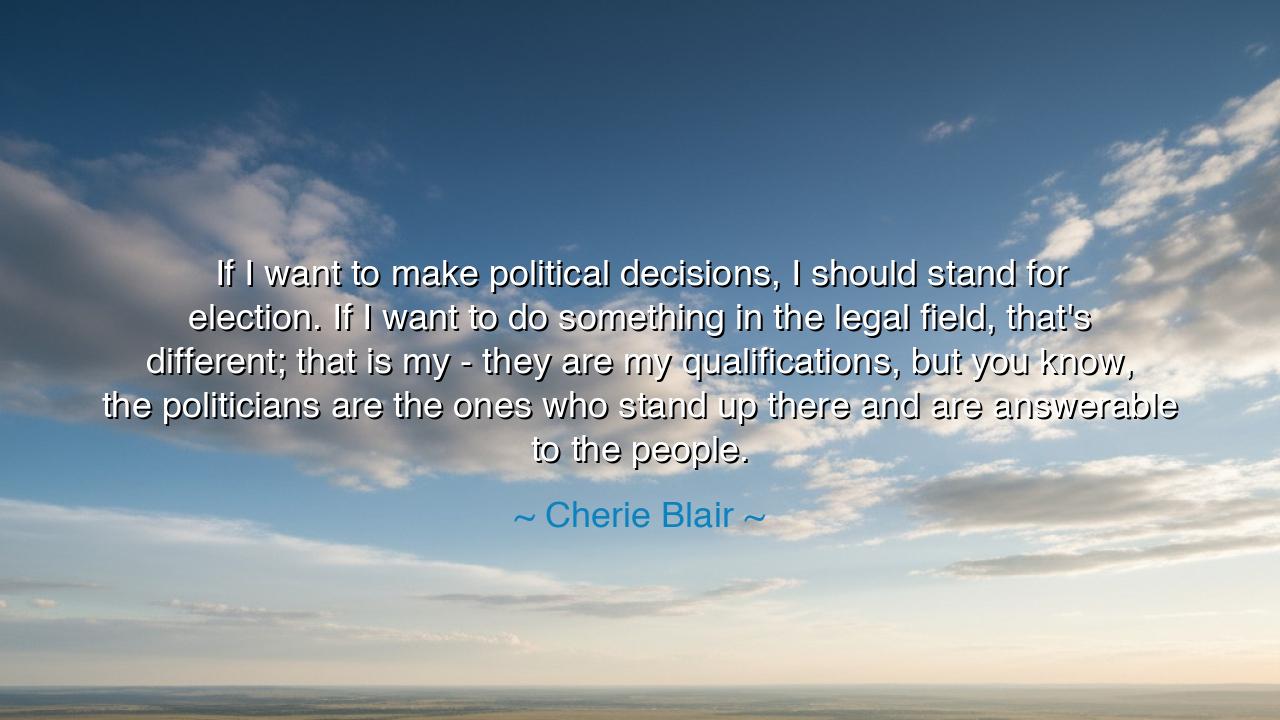
If I want to make political decisions, I should stand for
If I want to make political decisions, I should stand for election. If I want to do something in the legal field, that's different; that is my - they are my qualifications, but you know, the politicians are the ones who stand up there and are answerable to the people.






In the chronicles of human society, the delineation between law and politics has always been a matter of profound significance. Cherie Blair’s words, “If I want to make political decisions, I should stand for election. If I want to do something in the legal field, that's different; that is my - they are my qualifications, but you know, the politicians are the ones who stand up there and are answerable to the people,” illuminate a timeless truth: authority and responsibility must align with role and expertise, and each domain—political or legal—carries distinct obligations and forms of accountability. Here lies a meditation on vocation, duty, and the wisdom of understanding one’s proper sphere of influence.
From the courts of Athens to the councils of medieval Florence, societies recognized that those entrusted with legal authority were distinct from those wielding political power. Judges and advocates were expected to apply principles of law impartially, guided by study and expertise, while politicians were accountable to the populace for the broader direction of governance. Blair’s reflection echoes this ancient understanding: expertise in law provides the tools for justice, but it does not confer the mandate to legislate or govern beyond one’s qualifications.
History provides vivid illustration. In 12th-century England, the emergence of professional judges under Henry II marked a separation of legal function from political ambition. Judges were tasked with interpreting the law, while monarchs and parliaments made decisions about policy and taxation. Similarly, Blair’s observation distinguishes the realms of legal practice from electoral politics: one may exercise influence through expertise and judgment without claiming the mantle of popular decision-making.
Consider the contemporary example of Ruth Bader Ginsburg, who, though deeply involved in legal advocacy and the advancement of rights, never sought electoral office. Her authority derived from legal qualifications, rigorous study, and the capacity to interpret the law, rather than from the mandate of political popularity. The politicians who enact and enforce laws remain accountable to the electorate, while the legal expert serves as interpreter, guide, and guardian of justice. Blair’s distinction clarifies this essential balance between responsibility and accountability.
The philosophical resonance of Blair’s words is profound: responsibility must be coupled with legitimacy, and authority must arise from the proper source. Attempting to exercise political power without electoral mandate undermines democratic accountability, while attempting to legislate as a legal practitioner risks conflating impartial judgment with political ambition. Each role—lawyer, judge, politician—carries its own tools, duties, and measures of answerability.
A real-life illustration reinforces this lesson. In early 20th-century Germany, lawyers and judges occasionally engaged in political maneuvering that blurred the lines of their professional duties, leading to miscarriages of justice and erosion of public trust. Conversely, those who respected the boundary between legal expertise and political authority maintained integrity and societal confidence, demonstrating the wisdom that Blair articulates: know the scope of your authority, and act within it responsibly.
Practically, this teaching calls for clarity and humility. Recognize your qualifications, understand the limits of your mandate, and respect the accountability structures inherent in different roles. For those in law, focus on justice and interpretation; for those in politics, focus on representation and decision-making. Overstepping these boundaries may yield influence, but it risks undermining both legitimacy and ethical responsibility.
Thus, Cherie Blair’s reflection endures as a timeless admonition: authority is not merely the power to act, but the responsibility to act within one’s proper domain. Let this wisdom guide all who aspire to positions of influence, reminding us that the legitimacy of action derives from alignment of expertise, role, and accountability. In respecting these distinctions, society preserves both justice and democratic integrity, ensuring that power serves purpose, and that responsibility meets its rightful measure.






AAdministratorAdministrator
Welcome, honored guests. Please leave a comment, we will respond soon